OUR TREATMENTS
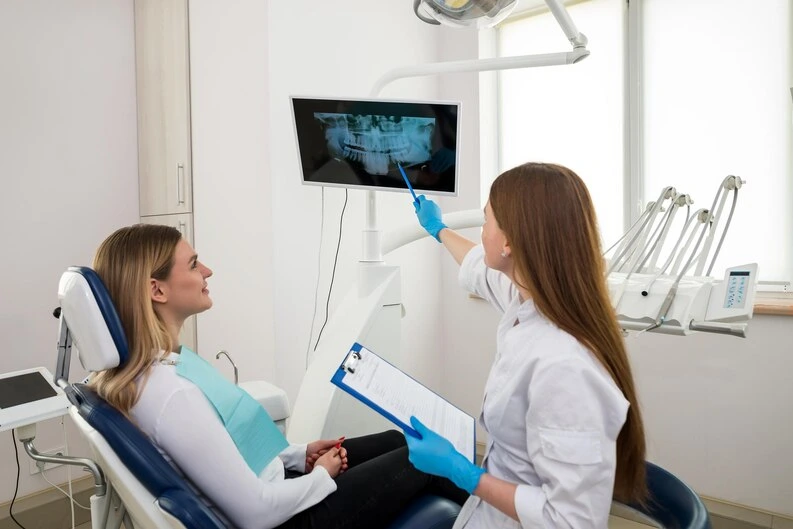
Full Dental Exam & X Rays:
A dental exam and X-ray are essential components of routine dental check-ups and diagnostics. They allow dentists to assess and monitor a patient's oral health comprehensively.
During a dental exam, the dentist evaluates the overall oral health of the patient. The examination includes:
Visual Inspection: The dentist visually examines the teeth, gums, tongue, and other oral tissues for signs of decay, gum disease, or any abnormalities.
Dental Probing: The dentist uses a dental instrument to check for gum pockets or areas of sensitivity, which may indicate gum disease or other dental issues.
Bite and Jaw Evaluation: The dentist checks the patient's bite and jaw alignment, looking for signs of misalignment or temporomandibular joint (TMJ) issues.
Oral Cancer Screening: The dentist checks for signs of oral cancer, including examining the lips, cheeks, tongue, and throat for any unusual lesions or discolorations.
Dental X-rays, also known as radiographs, are diagnostic images that provide a detailed view of the teeth and supporting structures. They help dentists identify dental problems that may not be visible during a visual exam. Timely visits to the dentist help in early diagnosis of and maintenance of healthy teeth and gums. Recommended twice a year (Six-monthly).
Teeth Cleaning & Polishing:
Teeth cleaning and polishing are essential dental procedures for maintaining a healthy and bright smile. Regular dental cleanings, performed at the dental office, involve removing plaque, tartar, and stains that can't be eliminated through regular brushing and flossing. Plaque is a sticky film of bacteria that can lead to cavities and gum disease, while tartar is hardened plaque that cannot be removed without professional help.
Polishing helps to smoothen the tooth surfaces, making it harder for plaque to accumulate. It also enhances the appearance of the teeth by removing surface stains, giving the teeth a brighter and cleaner look. The procedure is typically painless, and local anesthesia is not necessary unless there are specific dental issues requiring it. Dental cleaning and polishing are recommended at least once a year to maintain optimal oral hygiene and prevent potential dental problems. Regular dental check-ups and cleanings play a vital role in promoting overall oral health and well-being.This process helps prevent gum disease and cavities while promoting overall oral health and well-being.
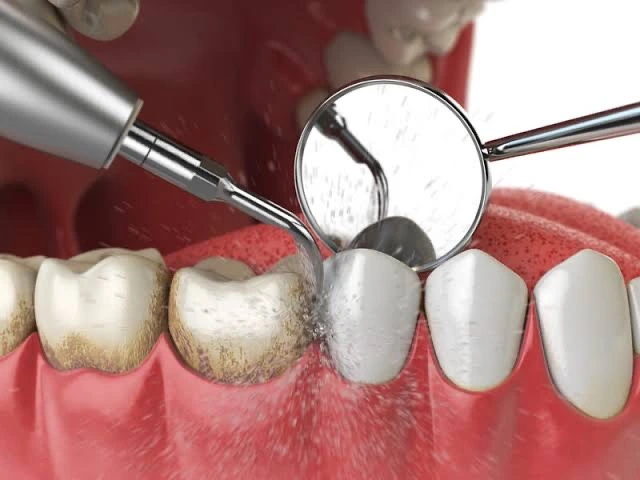
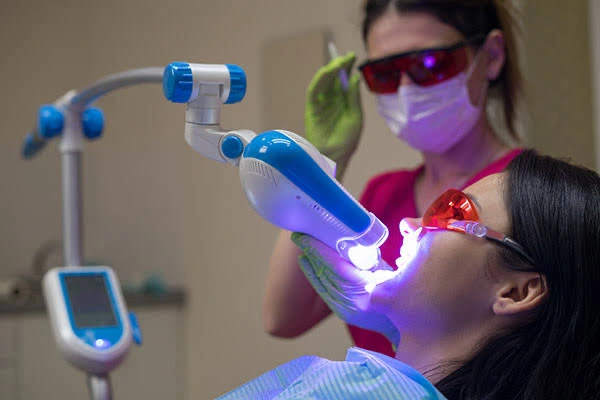
Teeth Whitening:
Teeth whitening, on the other hand, is a cosmetic procedure that lightens the natural color of teeth, combating discoloration caused by factors like aging, coffee, tea, or smoking. It can be done in the dental office for optimal results.
The procedure involves the application of a bleaching agent which breaks down stains and discolorations on the enamel's surface, resulting in a whiter shade of teeth. Teeth whitening can effectively remove stains caused by certain foods, beverages (like coffee and tea), tobacco use, and natural aging.
While teeth cleaning is a routine procedure and suitable for most people, teeth whitening may not be suitable for everyone, especially those with dental conditions. It's crucial to consult a dentist before opting for any whitening treatment to ensure it's safe and effective for individual dental health. Some people may experience temporary tooth sensitivity or gum irritation as side effects. But this subsides within a few days. Proper dental care and limiting staining substances can help maintain the results of teeth whitening over time.
Tooth Coloured Fillings:
Dental Fillings are restorations used to repair teeth damaged by decay or fractures. The process involves removing the decayed or damaged portion of the tooth and filling the space with a suitable material, like composite resin or glass ionomer cement. This procedure helps restore the tooth's structure and function, preventing further decay and pain.
These white filling materials are a popular alternative to traditional silver amalgam fillings. They blend seamlessly with the natural color of the tooth. In addition to their cosmetic benefits, tooth-colored fillings require less removal of healthy tooth structure compared to amalgam fillings, which helps to preserve the tooth's strength and integrity.
Regular dental check-ups help detect cavities early, enabling timely filling to avoid more extensive dental treatments. Dentists will recommend the most appropriate filling material based on individual needs and preferences, ensuring optimal dental health.
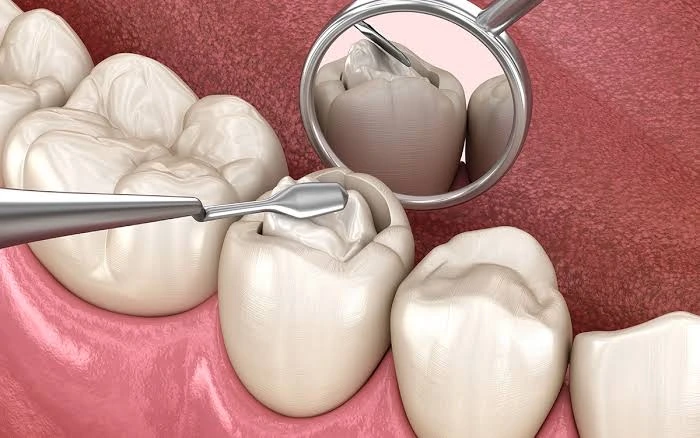
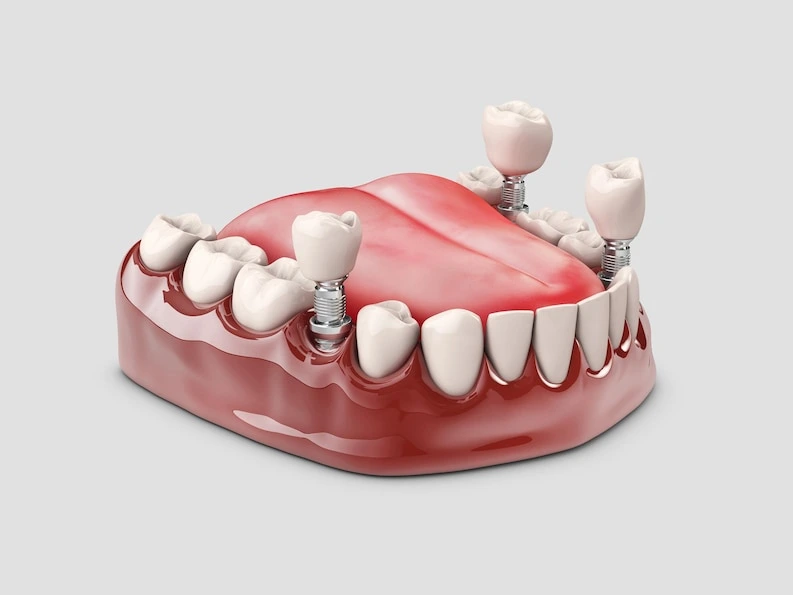
Dental Implants:
Dental implants are advanced dental restorations used to replace missing teeth in a FIXED manner. They consist of a titanium fixture surgically placed into the jawbone, acting as an artificial tooth root. The fixture fuses with the bone during the healing process, providing a stable foundation. A custom-made crown is then attached to the implant, resembling a natural tooth after a few months.
Dental implants offer several advantages, including improved chewing ability, speech, and aesthetics. They prevent bone loss in the jaw, unlike bridges or removal appliances as they provide constant stimulation. This makes them long-lasting with proper care. Dental implants are suitable for individuals with one or more missing teeth and offer a permanent, functional, and realistic solution. However, candidacy is determined based on individual oral health and bone density. Regular dental check-ups are crucial for ensuring the success and longevity of dental implants.
Root Canal Therapy:
A root canal is a dental procedure used to treat infected or damaged pulp inside a tooth. When the pulp, which contains nerves and blood vessels, becomes infected due to deep decay, cracks, or trauma, it can lead to severe pain and potential tooth loss. The root canal procedure involves removing the infected pulp, cleaning the inside of the tooth, and then sealing it with a rubber-like material called gutta-percha..
Root canals save teeth from extraction and alleviate pain by removing the source of infection. After the procedure, a dental crown is usually placed over the treated tooth to provide additional protection and restore its function and appearance. With advancements in dental technology and techniques, root canals are now relatively painless and have a high success rate, allowing patients to preserve their natural teeth and maintain good oral health. Regular dental check-ups help in early detection and timely treatment of issues that may require root canal therapy and ensure a good overall prognosis in order to maintain the tooth for the following years to come.
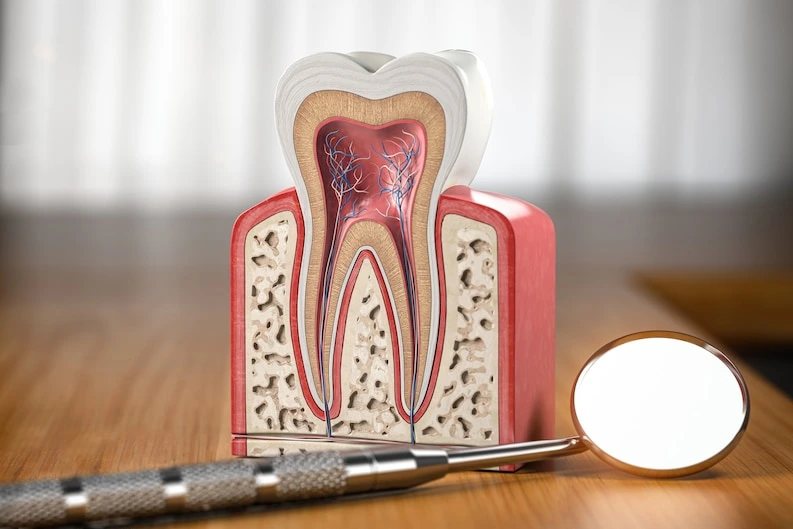
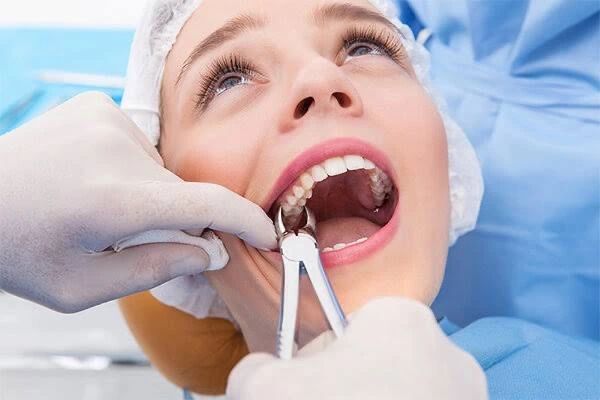
Tooth Extraction (Removal):
Tooth extraction is a common dental procedure where a tooth is removed from its socket due to severe decay, infection, or other dental issues. It is performed under local anesthesia, ensuring a near painless experience. After the extraction, patients may experience some discomfort, which can be managed with medications and proper care. .
The most common extractions are for wisdom teeth which are impacted or severely decayed causing pain and infection. These may also be minor surgical procedures which require a certain amount of bone trimming and removal if they are placed in the jaw in uncommon positions. Extractions when needed, prevents further dental problems and allow for potential dental restorations like implants or bridges to restore function and aesthetics. Regular dental check-ups help identify problematic teeth early, minimizing the need for extractions, helping to save the already present / natural teeth and promoting overall oral health.
Complete/Partial Dentures:
Dentures are removable dental appliances used to replace missing teeth and surrounding tissues. They are custom-made to fit a patient's mouth and come in two types: Complete dentures for those missing all teeth and Partial dentures for individuals with some natural teeth remaining. .
Dentures are made from durable materials like acrylic and designed to resemble natural teeth, restoring functionality and enhancing the appearance of the smile.
Proper care, regular dental check-ups, and adjustments by a dentist are essential for maintaining the comfort and longevity of dentures. With dentures, individuals can enjoy improved chewing ability, speech, and confidence in their daily activities.
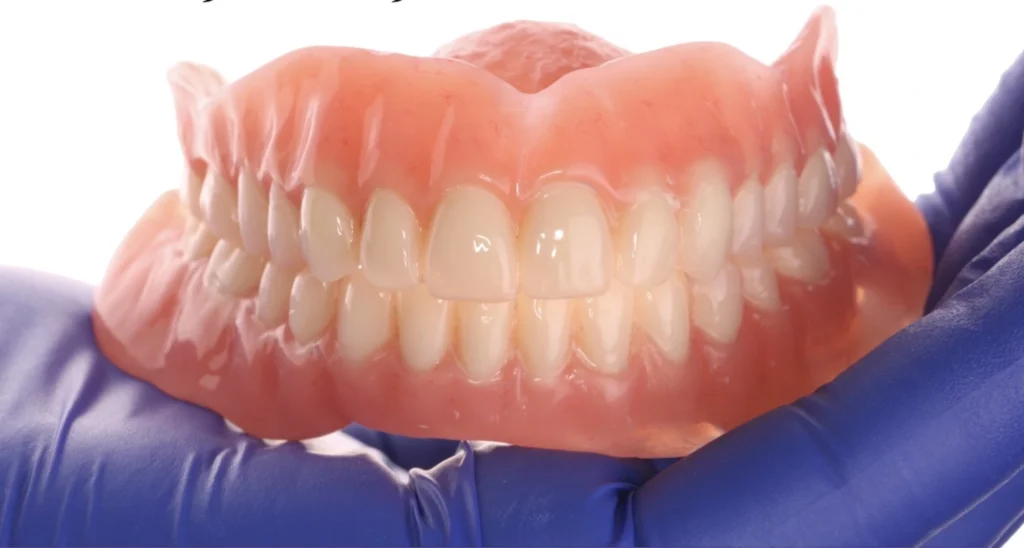

Crowns and Bridges:
Crowns and bridges are dental restorations used to repair and replace damaged or missing teeth. A dental crown, also known as a cap, is a custom-made covering that encases a damaged tooth, restoring its shape, strength, and appearance. Crowns are ideal for teeth with extensive decay, fractures, or after root canal treatment..
Bridges, on the other hand, are used to replace one or more missing teeth. They consist of two or more crowns on neighboring teeth with a false tooth (pontic) in between, filling the gap caused by missing teeth..
Both crowns and bridges are made from materials like porcelain, zirconia, or metal alloy, providing natural-looking and durable solutions. These restorations improve chewing ability, maintain facial structure, and enhance the overall smile, promoting confidence and oral health. Regular dental check-ups are essential for the longevity and success of crowns and bridges.
Dental Braces / Aligners:
Braces and aligners are orthodontic treatments used to correct dental misalignments and achieve straighter, healthier smiles. Traditional braces consist of metal brackets bonded to the teeth and connected by wires, gradually guiding teeth into proper alignment over time. They are suitable for more complex cases and are adjusted periodically by the orthodontist..
Aligners, like Invisalign, are clear, removable trays that fit over the teeth and gently shift them into place. They offer a more aesthetic alternative to traditional metal brackets. They are a discreet and convenient option, allowing easy removal for eating and oral hygiene..
Both braces and aligners can correct issues like crooked teeth, overcrowding, and bite problems, improving oral health and aesthetics. The choice between braces and aligners depends on the severity of the misalignment and the patient's preferences. Regular check-ups with the orthodontist ensure treatment progress and successful outcomes.


Smile Makeover:
A smile makeover is a comprehensive and personalized dental treatment aimed at enhancing the appearance of the smile. It involves a combination of cosmetic procedures, such as teeth whitening, dental veneers, dental crowns, orthodontics, and gum contouring, among others..
The process begins with a consultation where the dentist evaluates the patient's oral health and discusses their aesthetic goals. Using advanced technology, the dentist designs a treatment plan tailored to address specific concerns and create a beautiful, harmonious smile..
Smile makeovers can correct various imperfections, including stained or discolored teeth, gaps, misalignment, and chipped teeth. The result is a radiant and confident smile that not only improves aesthetics but also boosts self-esteem. Regular dental check-ups and good oral hygiene habits help maintain the longevity and brilliance of the smile makeover.
Child dentistry (Pedodontics):
Child dentistry, also known as pediatric dentistry, is a specialized branch of dentistry focused on the oral health of children from infancy through adolescence. Pediatric dentists are trained to handle the unique dental needs of children, including monitoring oral development, providing preventive care, and treating dental issues specific to young patients..
Child dentistry emphasizes early dental visits to promote good oral hygiene habits and prevent dental problems. Services include dental exams, cleanings, pulpectomy, space maintainers, fluoride treatments, sealants, and cavity fillings. Pediatric dentists create a child-friendly and welcoming environment to ensure a positive dental experience for young patients. Unlike earlier times, dentists now make sure that the milk teeth which are decayed can be saved with advanced procedures in order to guide the permanent teeth in proper position and prevent misalignment..
By instilling proper oral care habits at an early age and addressing dental concerns promptly, child dentistry plays a crucial role in maintaining children's oral health and setting the foundation for a lifetime of healthy smiles.

